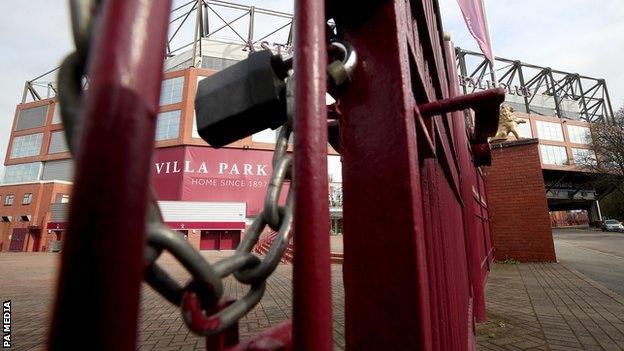Premier League returns: 'Life has not been the same without football'
- Published
- comments

Villa Park will be the first stadium to host Premier League football without supporters on Wednesday
The Premier League's "Project Restart" finally sees mission accomplished on Wednesday when - exactly 100 days after it all stopped - the great national escapism of domestic football resumes again.
Aston Villa will walk out to face Sheffield United in a world that has changed and in a sporting landscape transformed by the global Covid-19 pandemic, in this instance from the usual seething mass of the Holte End to a virtually deserted high-security stadium.
It was Villa who saw the last Premier League action in a 4-0 loss at Leicester City on 9 March before the top flight was closed down after Arsenal manager Mikel Arteta tested positive for coronavirus.
We have become accustomed to glimpses of the new reality in the Bundesliga and La Liga, complete with socially-distanced goal celebrations but still with the same passions on the pitch and among supporters watching from afar.
Sport is a very distant priority compared to tackling this crisis but the emotions will be stirred simply by the sight (and in this case sounds) of your favourite team in action once more, at whatever level they compete.
Those of us who have led the privileged life being paid to watch football, those of us who last saw a live match when Liverpool lost to Atletico Madrid in a Champions League game many feel should never have been played given its potential coronavirus consequences, have actually discovered what life without football is like.
And we have discovered it is not the same.
Time with the family is precious, the garden may look neater and there is even more time to make a complete mess of the simplest of household chores - but football will be welcomed back with open arms by millions across the nation.
Everton manager Carlo Ancelotti is credited with first using the phrase "football is the most important of the less important things in the world" and its absence has enabled so many to re-engage with what makes that phrase ring gloriously true.
We have been able to wallow in the nostalgia of great players, recalling great games and great moments.
How would Liverpool celebrate a title win without fans? Klopp speaks to BBC Radio 5 Live
Supporters have been able to relive old triumphs and disappointments via re-runs of cup finals and big games, experiencing the swirl of emotions that makes football matter so much, even at the times when you know it should not.
We have been transported around the globe on a journey into football's past, a time when the Premier League was a pipe dream of five big clubs and the game did not seem poorer for it.
The "watchalong" has become required viewing as those involved relived that history, from the 1966 World Cup final, Euro 96 when football came home for a glorious summer and the trials, triumphs and tribulations of Scotland and Wales on the global stage.
It has been a simple, sustaining pleasure to relive and write about those glorious times while waiting for the action to resume, for another small sliver of normality to re-enter the lives of so many suddenly robbed of the pastime they love.
Yes, it will all happen at 6pm on Wednesday in a giant, empty stadium just off the M6 at Birmingham but it will be a moment of huge significance.
As those in our journalistic community exchanged messages waiting for football's return, recurring themes emerged.
Never again will we complain about the dull goalless draw. We may report it as such but it will no longer be a chore.
And even VAR, the cause of so much consternation and comment, may be just be greeted like an old friend rather than a needless, inconvenient intruder on the old order.
Absence will have made the heart grow fonder, even for the things we did not care for before, including the inevitable "what game are you watching?" messages after even the most innocuous of observations.
Man Utd's Rashford speaks about mother's sacrifices in his bid to end food poverty
Footballers, having seemingly been identified as "get your hands in your pockets" scapegoats early in this pandemic, have also played their part, particularly Manchester United's young England striker Marcus Rashford.
He has emerged as one of the key figures, not by design but by his wonderful, selfless efforts, in ensuring so many footballers made a nonsense of that unjustified singling out.
And when the Premier League's players finally walk out again, there will be a reference to another pressing matter in this current climate, as shirt names will be replaced with the words "Black Lives Matter" for the first 12 matches of the re-started season, in solidarity with protests over the death of George Floyd in America and the fight to eradicate racial prejudice.
For the media present there will be no long build-up to the games, no long discussion of a great match.
We will be in 90 minutes before kick-off and out 60 minutes after the final whistle - but it will be a joy to be back and a privilege for those of us who are granted entry as the chosen few.
If cynicism existed - and of course it did - our encounter with the real world, the important things, will have removed so much of it.
Supporters will, for now, be watching from their living rooms but old passions will re-surface instantly, even though the roar of the crowd might be replaced by the new artificial TV soundtrack used in an attempt to enhance the atmosphere and the watching experience.
And then the old football habits that will never die, the agony of victory and defeat, will resurface.
Liverpool's first title in 30 years, the fight to avoid relegation, the battle for the top four, the FA Cup, the big European competitions - muscle memory will soon kick in.
Of course, in the strictly football context, the game will only return to its former self when fans can meet before the game, pack out a stadium, then congregate later to chew the fat over what they have just seen, complain about a decision, celebrate a great goal.
This is all to come because we are living with what has been labelled "the new normal" - but for now the return of the football in this somewhat reduced and vastly different form will provide the escapism, fill the void, provide the passion.
And even those of us who have watched thousands of games all over the world over three decades cannot wait for the pleasure of its return.
